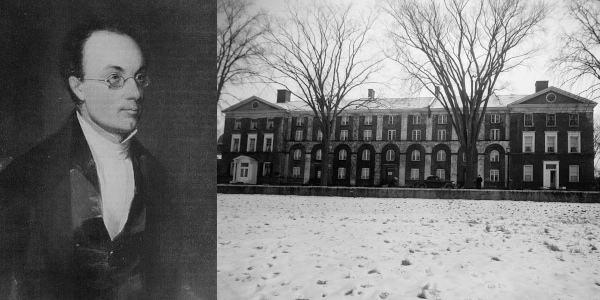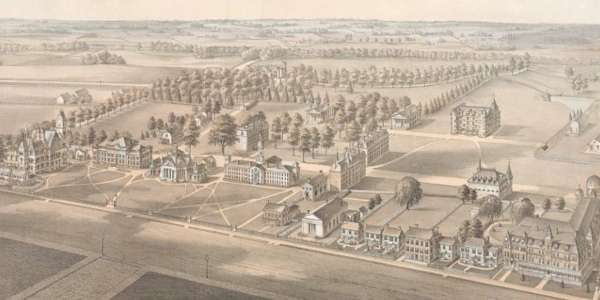Sponsor this page. Your banner or text ad can fill the space above.
Click here to Sponsor the page and how to reserve your ad.
-
Timeline
1824/1825 Detail
December 24, 1824 - The first fraternity in the United States is begun, Chi Phi, at Princeton University.
November 26, 1825 - The first college social fraternity, Kappa Alpha, is formed at Union College, Schenectady, New York.

It's a bit of a quibble as to who was first. There's those that contend it's certainly the folks at Princeton (known as the College of New Jersey until 1896) who founded the first college fraternity in 1824. There's others, when you include the word social and continuous, that contend it was one year later at Union College that should get the nod. And not to confuse things even further, but, if you think an honors society joins the fray of firsts, then the College of William and Mary had one of those fraternities all the way back in 1776, Phi Betta Kappa Society. We're not gonna count that one for this article, but there are the quibbles.
Princeton had been founded in 1746 as the College of New Jersey, the fourth (some contend, although there are quibbles there as well) or ninth oldest university in America, well behind the first, which was Harvard. So, it had been awhile since the establishment of the College of New Jersey for the men at the college to begin to organize into various organizations. The Chi Phi Society was established at the College of New Jersey on December 24, 1824 by Robert Baird, a tutor at the college, as well as faculty and undergraduates at both the College of New Jersey and the Princeton Seminary, a separate school. Other original founders included John McLean, Jr., a professor, Archibald Alexander, James Alexander, James Carnahan, Luther Halsey, Charles Hodge, Charles Hall, Edward Norris Kirk, and William Swan Plumer.
Today's modern line of the fraternity, however, only dates back to 1854, when it was re-established, using some of the tenants of the past organization from 1824. John McLean, Jr., whose uncle of the same name, John McLean, Jr., who had been an original founder when a professor of the College in 1824, then becoming the College President from 1854-1868, had records of the original society. The younger McLean, Charles Smith Degraw, and Gustavus W. Mayer reestablished it then, however, again, the chapter of Chi Phi at Princeton was short-lived, until 1859. Why had there been the original lapse? Good question we don't know the answer to. It seems, however, that it might have lasted under one year before it was absorbed into other societies.
Union College, Kappa Alpha Society
So why should the Kappa Alpha Society at Union College, a private liberal arts college established in 1795 by the New York State Board of Regents as its first college institution from the original Schenectady Academy, established in 1785, be considered the first. Well, there's that lapse in Princeton's claim when the Chi Phi fraternity went away. So, Kappa Alpha Society, both a literary and social organization, is the oldest continuously running fraternity in the United States. It is today still around, although small in comparison to other fraternities born after, with only nine active chapters. Union College, however, is known as the forerunner of the modern system of secret society, literary societies, and Greek letter organizations we now deem fraternities. Funny how not much is mentioned at the start of these organizations as to how they've actually morphed into pure social organizations with little to do with their initial founding ideas.
So how did Kappa Alpha actually begin at Union College? Student John Hart Hunter had enrolled at Union College at the age of seventeen in 1824, immediately placed into its Junior class. It took one year on campus for he and eight other students (John McGeoch, Isaac W. Jackson, Thomas Hun, Orlando Meads, James Proudfit, Joseph Anthony Constant, Arthur Burtis, who was Hart's roommate, and Joseph Law) to found Kappa Alpha on November 26, 1825 as the first Greek letter social fraternity. Phi Betta Kappa had been around for fifty years in other forms and areas, however, this fraternity would be a social organization controlled by students, not alumni, and focus on a progressive orthodoxy. That focus on progress was considered heresy by many theologians at the time, but not the original founders of the Union College fraternity.
"After we were domiciled in our upper chamber, in the fourth story of the south section --- South College --- northeast corner... we now and then beguiled the long winter evenings and entertained our friends with a few baked potatoes and salt and comforted them with apples. Jackson, Hun, Meads, Constant, and McGeoch were often the genial sharers of our simple meal, which was enlivened with mirth and wit and merry song.... It was determined to raise Hunter to an elevated seat on the woodpile, which stood in the corner of the room. When he was exalted to his high eminence, with his pipe in his mouth, he became the leader of this little band. Whereupon I suggested it would be right for us to get our light from this central luminary and that I would carry it to the others.... This band was now beginning to assume shape and form and comely order," Arthur Bertis.
Ironically, despite its focus on progress which went against many church teachings at the time, many in the group went on to become seminary students and ministers, including John Hart Hunter. He would, oddly, go to Princeton Theological Seminary, a different school than Princeton, although supported by the directors of the College of New Jersey when established in 1812 and part of the short-lived Chi Phi Fraternity there. Today, the Presbyterian seminary has a reciprocity agreement with Princeton University. Hunter graduated from the seminary in 1828.
Phi Betta Kappa expanded to other colleges; the first, Williams College in 1833.
Image above: Montage (left) Rev. John Hart Hunter, unknown date, Kappa Alpha book. Courtesy Wikipedia Commons; (right) 1814 buildings of North and South College used as dormitories, unknown date, Historic American Buildings Survey. Courtesy Library of Congress. Image below: Lithograph of Princeton College, 1875, Thomas Hunter, Thomas M. Radcliff. Courtesy Library of Congress. Source Info: "Seven Oldest Fraternities in America," oldest.org; Kappa Alpha Society, ka.org; Union College; chiphi.org; Princeton University; Hoboken Historical Museum; Wikipedia Commons.

History
Photo Bomb
So why should the Kappa Alpha Society at Union College, a private liberal arts college established in 1795 by the New York State Board of Regents as its first college institution from the original Schenectady Academy, established in 1785, be considered the first. Well, there's that lapse in Princeton's claim when the Chi Phi fraternity went away. So, Kappa Alpha Society, both a literary and social organization, is the oldest continuously running fraternity in the United States. It is today still around, although small in comparison to other fraternities born after, with only nine active chapters. Union College, however, is known as the forerunner of the modern system of secret society, literary societies, and Greek letter organizations we now deem fraternities. Funny how not much is mentioned at the start of these organizations as to how they've actually morphed into pure social organizations with little to do with their initial founding ideas.
So how did Kappa Alpha actually begin at Union College? Student John Hart Hunter had enrolled at Union College at the age of seventeen in 1824, immediately placed into its Junior class. It took one year on campus for he and eight other students (John McGeoch, Isaac W. Jackson, Thomas Hun, Orlando Meads, James Proudfit, Joseph Anthony Constant, Arthur Burtis, who was Hart's roommate, and Joseph Law) to found Kappa Alpha on November 26, 1825 as the first Greek letter social fraternity. Phi Betta Kappa had been around for fifty years in other forms and areas, however, this fraternity would be a social organization controlled by students, not alumni, and focus on a progressive orthodoxy. That focus on progress was considered heresy by many theologians at the time, but not the original founders of the Union College fraternity.
"After we were domiciled in our upper chamber, in the fourth story of the south section --- South College --- northeast corner... we now and then beguiled the long winter evenings and entertained our friends with a few baked potatoes and salt and comforted them with apples. Jackson, Hun, Meads, Constant, and McGeoch were often the genial sharers of our simple meal, which was enlivened with mirth and wit and merry song.... It was determined to raise Hunter to an elevated seat on the woodpile, which stood in the corner of the room. When he was exalted to his high eminence, with his pipe in his mouth, he became the leader of this little band. Whereupon I suggested it would be right for us to get our light from this central luminary and that I would carry it to the others.... This band was now beginning to assume shape and form and comely order," Arthur Bertis.
Ironically, despite its focus on progress which went against many church teachings at the time, many in the group went on to become seminary students and ministers, including John Hart Hunter. He would, oddly, go to Princeton Theological Seminary, a different school than Princeton, although supported by the directors of the College of New Jersey when established in 1812 and part of the short-lived Chi Phi Fraternity there. Today, the Presbyterian seminary has a reciprocity agreement with Princeton University. Hunter graduated from the seminary in 1828.
Phi Betta Kappa expanded to other colleges; the first, Williams College in 1833.
Image above: Montage (left) Rev. John Hart Hunter, unknown date, Kappa Alpha book. Courtesy Wikipedia Commons; (right) 1814 buildings of North and South College used as dormitories, unknown date, Historic American Buildings Survey. Courtesy Library of Congress. Image below: Lithograph of Princeton College, 1875, Thomas Hunter, Thomas M. Radcliff. Courtesy Library of Congress. Source Info: "Seven Oldest Fraternities in America," oldest.org; Kappa Alpha Society, ka.org; Union College; chiphi.org; Princeton University; Hoboken Historical Museum; Wikipedia Commons.

History
Photo Bomb






